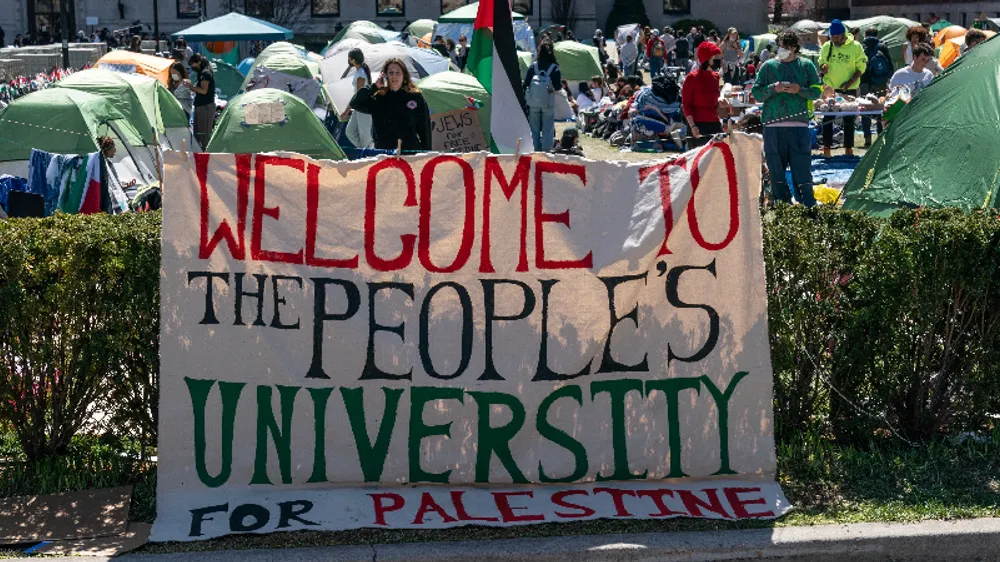
Anti-Palestinianism and Challenges to Freedom of Speech
As the student-led protest movement against the war on Gaza is increasingly expanding across campuses in the United States, the public display of dissent against the genocide has been met with intervention by law enforcement and condemnations from political elites. These initial reactions to the protests reaffirm the centrality of anti-Palestinianism in the dominant political discourse in the United States.

Since October 7, the Israeli regime has killed tens of thousands and displaced two million Palestinians in unspeakable crimes. The ongoing genocide adds to decades of ethnic cleansing, military occupation and apartheid under the Israeli settler-colonial regime.
While demonstrations against the genocide have taken place globally in the past months, the currently emerging movement in support of Palestine on university campuses in the United States appears unprecedented. Opposing the ongoing genocide in Gaza, protesters are demanding an end to U.S. military support for Israel and calling for U.S. academic institutions to disclose their financial ties with the Israeli regime and to divest.
Students’ calls for justice in Palestine and their affirmation of solidarity with the Palestinian struggle have been met with harsh scrutiny. On many campuses, the intervention of law enforcement has led to the arrest of hundreds. Videos documenting arrests and authorities’ use of force against protesters, including faculty, have attracted international attention.
Discrediting Calls for Justice as Hatred
The political elite was quick to discredit the peaceful demonstrators. U.S. President Joe Biden condemned the protests as “antisemitic”, resorting to a long established practice of dismissing criticism of Israel’s racist policies as anti-Jewish racism. Nancy Pelosi claimed the protests had a “Russian tinge”, resorting to another common tradition of labeling critics as backed by foreign governments that the U.S. views with suspicion. Earlier this year, Pelosi told protesters to “go back to China.”
These reactions do not come as a surprise. A racist anti-Palestinian discourse is employed as a tool of gatekeeping that allows to blame the victims and label Americans who are calling for an end to the war as security threats or morally corrupt Hamas supporters.
Indeed, anti-indigenous racism has been the guiding principle to incite support for Israel. The decades-long dehumanization of Palestinians in Western media and political discourse along the false equation of the Zionist movement with Judaism have been necessary to justify the Israeli settler-colonial conquest which, manifest in decades of apartheid and ethnic cleansing, has been engraved in dominant American and European fantasies of civilization and supremacy.
In this Western imaginary, Palestinian resistance, and in fact mere existence, is often vilified as ‘terrorism’ and calls for justice and liberation are viewed as fanatic hatred. The intimidation and silencing of protesters in support of justice in the West is closely tied to the violence in Palestine. Indeed, the Israeli apartheid regime can only exist through the perpetual oppression of Palestinians and is unthinkable without unconditional U.S. support. Any prospect of justice would in fact threaten Israel’s existence in its current form.
But what about Hamas?
It is within this context that the widespread protests against the genocide pose a significant challenge to political elites in the West, who have gone above and beyond to both deny and justify Israel’s genocide. Even while more than two million Palestinians in Gaza are under relentless bombardment and currently facing starvation, Western elites continue to police Palestinians’ reactions to their oppression.
Speaker of the U.S. House of Representatives, Mike Johnson, claimed that Hamas supports the protests on US campuses, referring to protesters at Columbia as “antisemitic bigots”. Similar sentiment was voiced in segments of U.S. and European, and in particular German, media. For instance, the German daily publication “Bild”, which is the best-selling newspaper in Europe, ran the headline “Radical student mobs celebrate terror. Is Hamas taking over power at US universities?”. These are mere examples of the widespread vilification of peaceful opposition to a genocide.
Democracy and Civilization
Such discourse is in stark opposition to the U.S. and its proxies’ reactions to previous protests in places in the Global South where the United States has geopolitical interests and voices support for protesters and alleged concerns about human rights. Indeed, it is the continuous insistence on their unique implementation of ‘democracy’, ‘human rights’ and ‘shared values’ that informs the Western illusion of superiority over the rest of the world.
The currently growing public pressure and contestation in the United States is another illustration of the magnitude of Zionism and its limitations on free speech.
While the Israeli regime has obliterated universities in Gaza and killed students and professors and while Palestinian academics and students are regularly targeted by the Israeli regime in all of Palestine, the growing solidarity movement on US campuses and the demands for accountability and divestment may have potential to challenge the colonial status quo in the West that exempts Palestinians from humanity.

